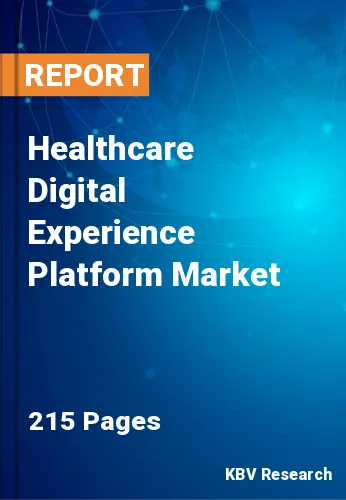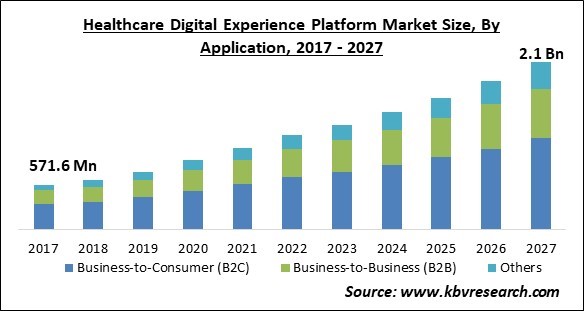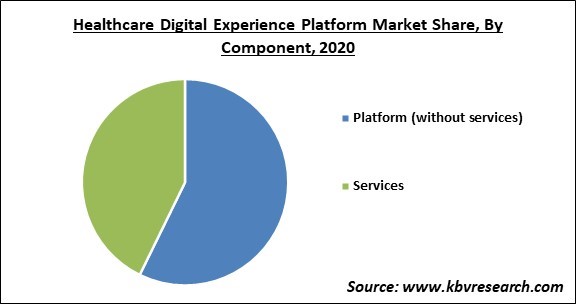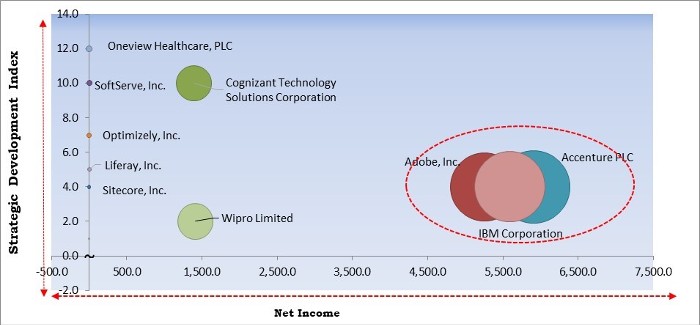
The Global Healthcare Digital Experience Platform Market size is expected to reach $2.1 billion by 2027, rising at a market growth of 12.8% CAGR during the forecast period.
The term "Digital Experience Platform" (DXP) refers to a developing type of corporate software that helps firms navigate the digital transformation process. Enterprises can use the technology to collect in-depth data on customer insights, create a consistent and linked customer experience, and digitise their business operations. Mobile applications, websites, portals, and other platforms are getting the benefit from this solution.
However, in order for a DXP to be successful, an organisation must consider not just the factors involved in providing a positive patient experience, but also the elements involved in streamlining hospital operations. Audience experience, management, and architecture are the three key categories of elements that make up a digital experience platform. To produce a powerful and effective DXP, all three elements must work together seamlessly.
Patient and user data management, mobility, multilanguage support, a tailored digital experience are all part of the architecture. In the healthcare industry, digital experience platforms may produce tremendous results. However, they must be well-designed and deployed, which can be difficult in hospitals that still rely on legacy systems.
The healthcare digital experience platform functions as an integrated platform that provide streamlined sales, service, and marketing, in line with the holistic view of each patient. These platforms majorly focus on cost-effectiveness and patient engagement. In addition, these platforms can be adjusted or customised to match the needs of such organisations, if payers choose to use them on a large basis.
Patient activity monitoring components, seamless interaction with diverse business activities, and in-built analytical tools are just a few of the advantages that healthcare digital experience platforms provide. The industry's major companies are concentrating on modernising their digital platforms by incorporating sophisticated technologies like machine learning (ML), artificial intelligence (AI), and big data into their business modules. As a result, market growth of healthcare digital experience platform is likely to accelerate in the next years.

The outbreak of the COVID-19 pandemic has compelled critical healthcare businesses to become digital in order to improve workflow efficiency and preserve business growth. In addition, ongoing activities for healthcare IT solutions have pushed the adoption of advanced digital experience platforms and services in developing countries even further.
To cut costs, the COVID-19 pandemic has enhanced the level of automation and digitalization in healthcare facilities. The digital experience platforms in healthcare allowed for more efficient operational processes and improved patient involvement in these crises. These platforms assist healthcare businesses in refocusing their efforts to adopt healthcare digital experience platforms in order to maintain business continuity and process optimization. As a result of the pandemic, more vendors are adopting healthcare digital experience platforms, which allow them to reach patients via numerous digital devices, facilitating upselling and cross-selling across the industry.
There is an increase in the adoption of smart devices by the healthcare professionals across developed nations like US. Physicians are increasingly using cellphones, which has led to an increase in the usage of digital health methods and platforms. Smartphones, tablets, and other mobile platforms are used by a majority of population across the world, and thus, physicians are highly using them twice as much as the general public.
The acceptance rate of the latest technologies and software in healthcare has improved significantly as a result of technological improvements within the healthcare sector of the world. There are many divisions of the digital health software market that include electronic health records (EHRs), mHealth, telemedicine, and healthcare analytics. Furthermore, the digital healthcare software would witness a huge spike in the future due to the low cost of these software applications.
Patient data security concerns may detract from the industry's value. The use of digital health solutions like electronic health records, e-prescriptions, and medical apps necessitates a high level of data protection. Breach of data security can result in massive losses of essential and personal information, such as medical records, which commonly contain social security numbers, insurance IDs, addresses, and medical details, harming the company's brand and operations results.

Based on component, the healthcare digital experience platform market is bifurcated into Platform and Services. The services segment garnered a significant revenue share in the healthcare digital experience platform market in 2020. It is owing to rising demand for services like education, training, and consulting from major end-use healthcare industries like biotechnology and pharmaceuticals, as well as healthcare professionals and payer organisations. These firms can use digital experience platform services to save costs, increase return-on-investment (ROI), and improve company operational performance.
By application, the healthcare digital experience platform market is classified into Business-to-Consumer (B2C), Business-to-Business (B2B) and others. The Business-to-Business (B2B) segment procured a significant revenue share in healthcare digital experience platform market in 2020. The B2B customer experience performance in the healthcare sector continues to lag and is frequently overshadowed by corporate priorities. Furthermore, there are many large-scale B2B companies that are actually consumer-centric, and are taking steps to become more consumer-centric, providing the opportunities to differentiate their brands and deliver superior customer experience.
On the basis of delivery mode, the healthcare digital experience platform is divided into cloud-based and on-premise. The cloud segment acquired the largest revenue share in the healthcare digital experience platform market in 2020. It is due to the growing demand for cloud technology across different healthcare organisations for secure information sharing, optimising costs, and enhancing operational efficiency, along with enhanced patient services.
| Report Attribute | Details |
|---|---|
| Market size value in 2020 | USD 875.9 Million |
| Market size forecast in 2027 | USD 2.1 Billion |
| Base Year | 2020 |
| Historical Period | 2017 to 2019 |
| Forecast Period | 2021 to 2027 |
| Revenue Growth Rate | CAGR of 12.8% from 2021 to 2027 |
| Number of Pages | 215 |
| Number of Tables | 334 |
| Report coverage | Market Trends, Revenue Estimation and Forecast, Segmentation Analysis, Regional and Country Breakdown, Competitive Landscape, Companies Strategic Developments, Company Profiling |
| Segments covered | Component, Application, Delivery Mode, Region |
| Country scope | US, Canada, Mexico, Germany, UK, France, Russia, Spain, Italy, China, Japan, India, South Korea, Singapore, Malaysia, Brazil, Argentina, UAE, Saudi Arabia, South Africa, Nigeria |
| Growth Drivers |
|
| Restraints |
|
Region-wise, the healthcare digital experience platform market is analyzed across North America, Europe, Asia Pacific and LAMEA. North America emerged as leading region in the healthcare digital experience platform market with the largest revenue share in 2020 and is estimated to maintain this dominance over the forecast period. It is because of the significant demand for healthcare digital experience platforms in the US healthcare business, as well as the presence of large-scale IT suppliers supplying these platforms in the region, such as Salesforce; SoftServe; Accenture; Adobe; IBM Corporation; Cognizant; and Wipro Digital.
Free Valuable Insights: Global Healthcare Digital Experience Platform Market size to reach USD 2.1 Billion by 2027

The major strategies followed by the market participants are Partnerships. Based on the Analysis presented in the Cardinal matrix; IBM Corporation, Adobe, Inc., Accenture PLC are the forerunners in the Healthcare Digital Experience Platform Market. Companies such as Cognizant Technology Solutions Corporation, Wipro Limited, Oneview Healthcare, PLC are some of the key innovators in the Market.
The market research report covers the analysis of key stake holders of the market. Key companies profiled in the report include SoftServe, Inc., Oneview Healthcare, PLC, Optimizely, Inc., Sitecore, Inc., Adobe, Inc., IBM Corporation, Accenture PLC, Cognizant Technology Solutions Corporation, Liferay, Inc., and Wipro Limited.
By Component
By Application
By Delivery Mode
By Geography
The healthcare digital experience platform market size is projected to reach USD 2.1 billion by 2027.
Growing adoption of smartphones and other mobile applications are driving the market in coming years, however, safety and security concerns regarding patients’ data limited the growth of the market.
SoftServe, Inc., Oneview Healthcare, PLC, Optimizely, Inc., Sitecore, Inc., Adobe, Inc., IBM Corporation, Accenture PLC, Cognizant Technology Solutions Corporation, Liferay, Inc., and Wipro Limited.
The Platform (without services) market acquired maximum revenue share in the Global Healthcare Digital Experience Platform Market by Component 2020, thereby, achieving a market value of $1.189 billion by 2027.
The On-premises market shows highest growth rate of 11% during (2021 - 2027). It is because of the high-end data protection offered by this deployment.
The North America market is fastest growing region in the Global Healthcare Digital Experience Platform Market by Region 2020, and would continue to be a dominant market till 2027.
Our team of dedicated experts can provide you with attractive expansion opportunities for your business.
